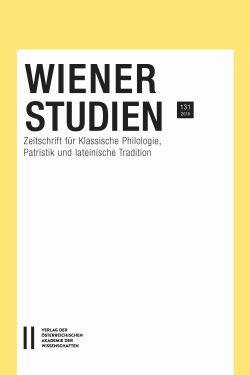
Wiener Studien 131/2018, pp. 179-205, 2018/07/11
Zeitschrift für Klassische Philologie, Patristik und lateinische Tradition

INHALT
Marco G e m i n, Platone incantatore: Phaed. 78a
Peter G r o s s a r d t, Der Heroikos des Flavius Philostrat – eine Nachlese
Beatrix F r e i b e r t, πόθεν δεῖ ἄρχεσθαι? Der Kommentator Elias über die Logik als erste Disziplin im Philosophieunterricht
Walter S t o c k e r t, Zu einer Korruptel in Plautus’ Aulularia (Vers 599)
Dorothea W e b e r, Der Stoiker als Autor: Senecas De tranquillitate animi
Brian A. K r o s t e n k o, Three Kinds of Ambiguity: Rhetoric and Christian Citizenship in the Martyr Act of Cyprian
Benjamin G a r s t a d, Alexander the Great’s Liberation of Rome and an Idiosyncratic Model of World History in the Chronicle of
John Malalas, the Excerpta Latina Barbari, and Fulgentius’ De aetatibus
Lukas J. D o r f b a u e r, quattus = quartus = „vier“. Zur Terminologie von Rechnungen mittels der Vielfachen des as in der Spätantike und im frühen Mittelalter
Álvaro C a n c e l a C i l l e r u e l o, An emendation to the Renotatio Isidori (CPL 1206º, BHL 4483)
Vincenzo O r t o l e v a, Gli Hermeneumata Celtis: osservazioni a proposito di alcuni studi recenti